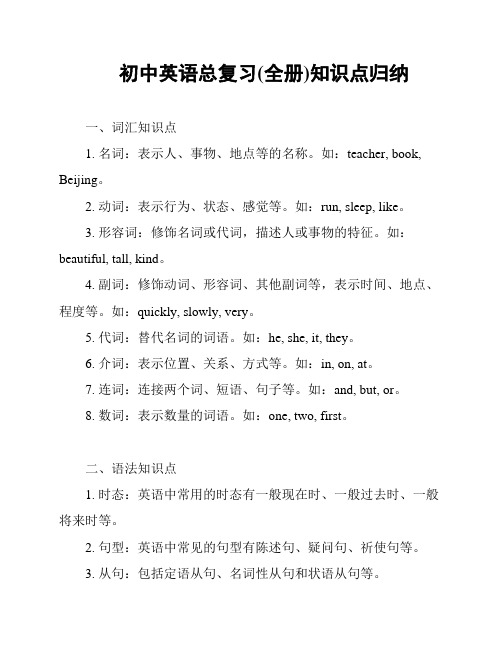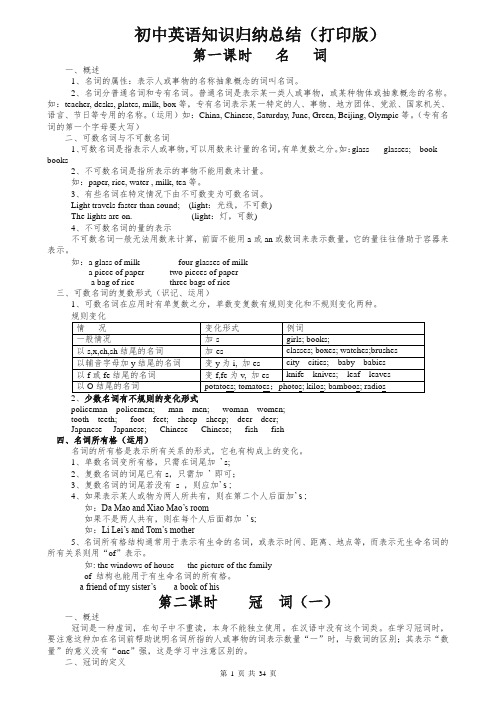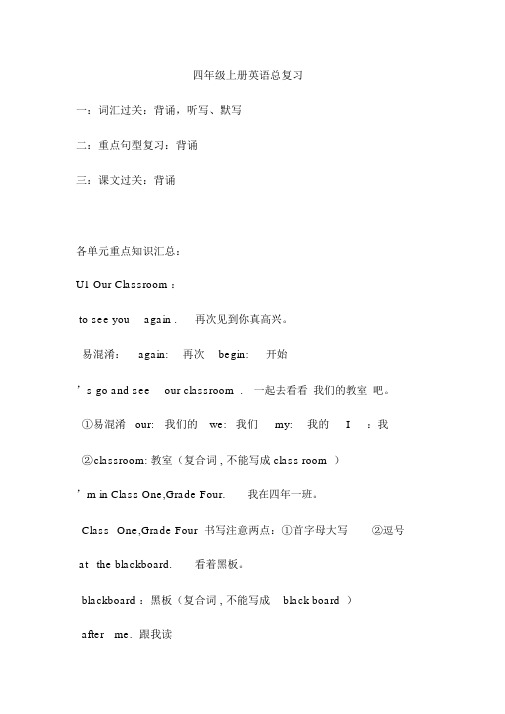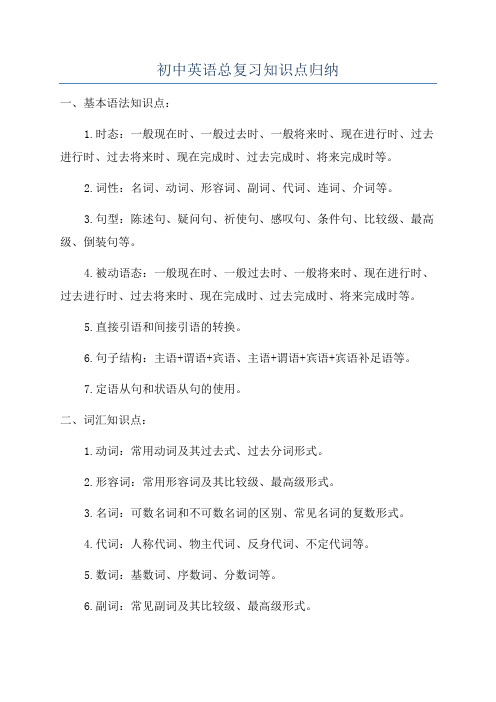英语总复习知识点过关.docx
初中英语总复习(全册)知识点归纳

初中英语总复习(全册)知识点归纳一、词汇知识点1. 名词:表示人、事物、地点等的名称。
如:teacher, book, Beijing。
2. 动词:表示行为、状态、感觉等。
如:run, sleep, like。
3. 形容词:修饰名词或代词,描述人或事物的特征。
如:beautiful, tall, kind。
4. 副词:修饰动词、形容词、其他副词等,表示时间、地点、程度等。
如:quickly, slowly, very。
5. 代词:替代名词的词语。
如:he, she, it, they。
6. 介词:表示位置、关系、方式等。
如:in, on, at。
7. 连词:连接两个词、短语、句子等。
如:and, but, or。
8. 数词:表示数量的词语。
如:one, two, first。
二、语法知识点1. 时态:英语中常用的时态有一般现在时、一般过去时、一般将来时等。
2. 句型:英语中常见的句型有陈述句、疑问句、祈使句等。
3. 从句:包括定语从句、名词性从句和状语从句等。
4. 否定形式:在英语中通过在句子中加入否定词来表示否定的意思。
5. 疑问形式:在英语中通过改变句子语序或加入疑问词来构成疑问句。
6. 介词短语:一种由介词和它的宾语构成的结构,用来修饰名词或动词。
三、阅读技巧1. 抓主题:阅读时要注意抓住文章的主题,从中找出关键信息。
2. 理解词义:通过上下文,猜测不认识的单词的意思。
3. 推理推断:通过已知信息进行推理,得出未知信息。
4. 划重点:将文章中所述的重要信息标记出来,有助于记忆和理解。
5. 阅读速度:提高阅读速度的技巧有先读标题、段落开头和结尾。
以上是初中英语总复的知识点归纳,希望对你的复有所帮助!。
(部编)人教版三年级英语上册总复习汇总

(部编)人教版三年级英语上册总复习汇总
本文档是对(部编)人教版三年级英语上册内容进行总复的汇总。
以下是每个单元的重点内容总结:
第一单元:Hello
- 介绍自我和问候语的基本用法和表达方式。
- 研究基本的问候语并能正确回应。
第二单元:My Family
- 研究家庭成员的称呼,如爸爸、妈妈、哥哥、姐姐等。
- 掌握描述家庭成员的基本句式。
第三单元:Numbers
- 研究基本的数字1-10,并能正确拼写和读出来。
- 了解数字的序数词用法。
第四单元:Colors
- 研究基本的颜色词汇,如红色、蓝色、绿色等。
- 能够用正确的颜色词汇来描述物品。
第五单元:Toys
- 研究常见的玩具名称,如球、熊、车等。
- 掌握描述玩具的基本句式。
第六单元:Food and Drinks
- 研究常见食物和饮料的名称,如面包、苹果、牛奶等。
- 能够用正确的词汇来询问和回答食物和饮料。
第七单元:Actions
- 研究常见动作词汇,如跳、走、唱等。
- 能够用正确的动作词汇来描述和询问别人的动作。
第八单元:Weather
- 研究描述天气的词汇,如晴天、雨天、风等。
- 能够用正确的句式来描述当天的天气情况。
以上是对(部编)人教版三年级英语上册每个单元的重点内容进行的总复习汇总。
希望能够帮助同学们进行复习,并顺利掌握这些基本的英语知识。
如有需要,还请详细参考教材内容。
初中英语总复习知识点归纳汇总(41页)

初中英语知识归纳总结(打印版)第一课时名词一、概述1、名词的属性:表示人或事物的名称抽象概念的词叫名词。
2、名词分普通名词和专有名词。
普通名词是表示某一类人或事物,或某种物体或抽象概念的名称。
如:teacher, desks, plates, milk, box等,专有名词表示某一特定的人、事物、地方团体、党派、国家机关、语言、节日等专用的名称。
(运用)如:China, Chinese, Saturday, June, Green, Beijing, Olympic等。
(专有名词的第一个字母要大写)二、可数名词与不可数名词1、可数名词是指表示人或事物,可以用数来计量的名词,有单复数之分。
如:glass-----glasses; book---- books2、不可数名词是指所表示的事物不能用数来计量。
如:paper, rice, water , milk, tea等。
3、有些名词在特定情况下由不可数变为可数名词。
Light travels faster than sound; (light:光线,不可数)The lights are on. (light:灯,可数)4、不可数名词的量的表示不可数名词一般无法用数来计算,前面不能用a或an或数词来表示数量,它的量往往借助于容器来表示。
如:a glass of milk ------ four glasses of milka piece of paper ------two pieces of papera bag of rice ------three bags of rice三、可数名词的复数形式(识记、运用)1、可数名词在应用时有单复数之分,单数变复数有规则变化和不规则变化两种。
policeman---policemen; man---men; woman---women;tooth---teeth; foot---feet; sheep---sheep; deer---deer;Japanese--- Japanese; Chinese --- Chinese; fish --- fish四、名词所有格(运用)名词的所有格是表示所有关系的形式,它也有构成上的变化。
英语过关考试知识点总结

英语过关考试知识点总结1. Grammara) Parts of Speech: This includes understanding the different parts of speech such as nouns, pronouns, verbs, adjectives, adverbs, prepositions, conjunctions, and interjections. It is important to know how each part of speech functions in a sentence.b) Sentence Structure: Understanding the structure of a sentence is vital. This includes knowing the subject, predicate, direct object, indirect object, and more.c) Verb Tenses: You need to have a good grasp of the various verb tenses such as simple present, simple past, present continuous, past continuous, present perfect, past perfect, and future tenses.d) Agreement: Understanding subject-verb agreement and pronoun-antecedent agreement is crucial.e) Sentence Types: Knowing how to form and identify simple, compound, complex, and compound-complex sentences.f) Modifiers: Understanding how to use adjectives and adverbs to modify nouns and verbs.2. Vocabularya) Word Families: Understanding the relationship between words and their derivations is important. Knowing the root word, prefixes, and suffixes can help in understanding and learning new words.b) Synonyms and Antonyms: Having a good grasp of synonyms (words with similar meanings) and antonyms (words with opposite meanings) will help in understanding the context of a sentence.c) Idioms and Phrasal Verbs: Understanding idiomatic expressions and phrasal verbs is important as they are commonly used in spoken English.d) Collocations: Knowing which words go together is important. For example, we say "heavy rain" and not "strong rain."e) Word Formation: Understanding how to form words using prefixes, suffixes, and root words is important.3. Reading Comprehensiona) Main Ideas and Supporting Details: Being able to identify the main idea of a passage and the supporting details is crucial in reading comprehension.b) Inference: Being able to make inferences based on the information given in the passage.c) Vocabulary in Context: Understanding the meaning of words based on the context in which they are used.d) Understanding Tone and Purpose: Being able to identify the author's tone and purpose in writing the passage.e) Understanding Organizational Patterns: Knowing how information is organized in a passage, such as cause and effect, compare and contrast, and chronological order.4. Writinga) Paragraph Structure: Being able to write well-structured paragraphs with a clear topic sentence, supporting details, and a concluding sentence.b) Coherence and Cohesion: Understanding how to connect ideas within a paragraph and between paragraphs.c) Sentence Variety: Being able to write sentences of different lengths and structures.d) Grammar and Vocabulary: Using correct grammar and a varied vocabulary to express ideas clearly.e) Essay Structure: Understanding the structure of an essay, including the introduction, body paragraphs, and conclusion.5. Speaking and Listeninga) Pronunciation: Being able to pronounce words and sounds correctly is important in speaking.b) Fluency: Being able to speak and understand English at a natural pace.c) Listening for Details: Being able to listen for specific information in a conversation or a lecture.d) Following Instructions: Being able to understand and follow spoken instructions.e) Asking and Answering Questions: Being able to ask for clarification and give clear answers in a conversation.In summary, passing an English exam requires a good understanding of grammar rules, vocabulary, reading comprehension, writing, speaking, and listening skills. By mastering these key knowledge points, you can improve your chances of passing an English exam with flying colors.。
(完整word版)英语复习资料(word文档良心出品)

U1 4.诸如背弃朋友这类事并不受法律制约,所以才有了我们称作的道德法庭Laws do not regulate such things as betrayal to friends, that is why there is what we call the court of morality 5.有人把今天的文化描述为快餐文化。
无论做什么事,人们只是追求用最短时间达到最大的满足Today’s culture is described as fast-food culture, whatever they may be; people just pursue the greatest satisfaction within the shortest time.6.常言说,天下没有免费的午餐。
如果你想要什么,就得去挣As the saying goes, there is no such thing as a free lunch. If you want something, go and earn it.U2 1.无论是友情还是爱情,你都不可能期待自己付出最少而得到最多。
In either friendship or love, you should never expect to receive the maximum while you give the minimum.2.我把全部希望寄托在他的承诺上,结果却发现他根本不是个真诚的人。
I built all my hopes on his promises, only to find that he was not a man of sincerity at all.3.我们带母亲去了所有我们能找到的最好的医院,但一切努力都是徒劳的,母亲还是没能熬过那次疾病。
We took mother to all the best hospitals we could find, but all our efforts were in vain; she failed to survive the disease.U3 1.千百年来哲学家们费尽心机从各自的角度阐释何为幸福.For thousands of years philosophers have taken pains to explain the meaning of happiness from their own points of view.2.刚上大学的时候,突然发现自己得处理所有日常事物,知道那是自己才觉得在父母身边生活真是幸福。
初中英语总复习知识点归纳(基本全了),DOC

欢迎阅读初中英语总复习知识点归纳????? ?冠词 a / an 的用法a用于辅音音素前?a useful book, ??a university, ??a “u”Once a week??? ?have a swim/walk/talk/look/dance/drink/ rest ??have a cold/ headache / fever /cough??? have a good time ??have a try?? in a hurry???? after a while??? keep a diary??? go for a walk ??in a minute ???in a word ??in a short while ??an则用于元音音素前an hour, an honest boy , an “A E F H I L M N O R S X”keep an eye on定冠词the的用法:1234或与5floor.6789)10) end,? all the age of sixthe day ,field,1)2词3)4)在称呼或表示官衔,职位的名词前不加冠词; He is captain of the team.5)在三餐、四季,球类运动、学科、娱乐运动的名称前,不加冠词如:have breakfast /supper / lunch,play basketball / football / volleyball / chess , in spring/summer/ autumn/ winter 6)当by 与火车等交通工具连用,表示一种方式时,中间无冠词;by bus/ train/ taxi/ bus/ ship ??7)Day and night? face to face? side by side? step by step?? watch TV? at school / work / home? at first/ last? in danger? in trouble? on foot? on duty? on watch? in bed? on time?? in time ?go to school?? go to work? by taxi / bike? at noon? at night? on TV ?at town部分词组有无冠词的区别in hospital 生病住院 in the hospital 在医院里in front of 在---的前面in the front of 在----内部的前面go to school 上学go to the school 到学校去a number of = a lot of 许多,谓语动词用复数。
闽教版本小学四年级的上册的英语总总结复习归纳.docx

四年级上册英语总复习一:词汇过关:背诵,听写、默写二:重点句型复习:背诵三:课文过关:背诵各单元重点知识汇总:U1 Our Classroom :to see you again .再次见到你真高兴。
易混淆:again:再次begin:开始’s go and see our classroom .一起去看看我们的教室吧。
①易混淆our:我们的we:我们my:我的I:我②c lassroom: 教室(复合词 , 不能写成 class room )’m in Class One,Grade Four.我在四年一班。
Class One,Grade Four 书写注意两点:①首字母大写②逗号at the blackboard.看着黑板。
blackboard :黑板(复合词 , 不能写成black board )after me. 跟我读after:在⋯之后isn ’t a ⋯它不是⋯isn ’t=is not不是U2 Our School1. Who’s that girl那个女孩是①区分: this个(近)that那个()②who's= who is是whose的2. That ’s Ma Li.那是。
that ’s=that is那是(可能出在填空)’s from Taiwan.她来自台湾。
① she’s =she is(可能出在填空)人称be ② be from:来自I amyou 、 we、they arehe、she、某人is③Taiwan地名、国家名首字母大写class are you in你在哪个班is our playground.是我的操。
, so many books!哇,这么多书!so many + 名词复数。
如: so many computer s so many potato es U3 Numbers and Animals1.数字单词的掌握。
(重点)其中: twenty 20 常考,但错误率高。
初中英语总复习知识点归纳

初中英语总复习知识点归纳一、基本语法知识点:1.时态:一般现在时、一般过去时、一般将来时、现在进行时、过去进行时、过去将来时、现在完成时、过去完成时、将来完成时等。
2.词性:名词、动词、形容词、副词、代词、连词、介词等。
3.句型:陈述句、疑问句、祈使句、感叹句、条件句、比较级、最高级、倒装句等。
4.被动语态:一般现在时、一般过去时、一般将来时、现在进行时、过去进行时、过去将来时、现在完成时、过去完成时、将来完成时等。
5.直接引语和间接引语的转换。
6.句子结构:主语+谓语+宾语、主语+谓语+宾语+宾语补足语等。
7.定语从句和状语从句的使用。
二、词汇知识点:1.动词:常用动词及其过去式、过去分词形式。
2.形容词:常用形容词及其比较级、最高级形式。
3.名词:可数名词和不可数名词的区别、常见名词的复数形式。
4.代词:人称代词、物主代词、反身代词、不定代词等。
5.数词:基数词、序数词、分数词等。
6.副词:常见副词及其比较级、最高级形式。
7.介词:常见介词及其使用。
三、阅读理解技巧:1.根据题目要求,选择合适的阅读篇章类型:记叙文、说明文、议论文等。
2.通读全文了解大意。
3.根据题目要求,扫读相关信息。
4.根据题目要求,细读相关细节。
5.根据问题,进行推理判断。
6.使用排除法,选择正确答案。
7.注意语法和词义的考查。
8.描述图表技巧:注意趋势和比较。
四、写作技巧:1.选择合适的写作题材:记叙文、说明文、议论文等。
2.准备好写作素材:主题句、主题句扩展、细节句、结论句等。
3.注意文章的结构:引子、承接段、中心段、结尾段。
4.使用恰当的连词和过渡词,使文段连贯。
5.注意时间和人称的一致性。
6.注意使用恰当的时态。
7.使用丰富的词汇和句式,使文章更生动有趣。
8.注意修辞手法的运用:比喻、拟人等。
以上是初中英语总复习的部分知识点归纳,希望对你的学习有所帮助。
如需更多相关知识,请继续加油学习!。
- 1、下载文档前请自行甄别文档内容的完整性,平台不提供额外的编辑、内容补充、找答案等附加服务。
- 2、"仅部分预览"的文档,不可在线预览部分如存在完整性等问题,可反馈申请退款(可完整预览的文档不适用该条件!)。
- 3、如文档侵犯您的权益,请联系客服反馈,我们会尽快为您处理(人工客服工作时间:9:00-18:30)。
英语总复习(三》1-穿:put on / wear=be in / dress(1)穿的对象是衣服:(put on / vvear=be in ) put on强调动作;wear强调状态(2)穿的对象是人:(dress ) dress sb. in sth. / dress oneself in sth. /be dressed in / dress up as eg: (l)My friend _________ / _____ a nice dress: today. =My friend ____ ______ a nice dress.(2)Ifs very cold outside,you,d better ______ your coat now.(3)The woman _____ h er daughter in a yellow dress yesterday.(4)That woman^s daughter is often ______in a yellow dress.(5)Would you like to _______________ ____ as Monkey King atHalloween ? (穿)2.interest& interesting & interested⑴ interest 译为“兴趣"感兴趣的事',如:places of interest; some interests(2)interesting 译为"有趣味的,使。
有趣”一般指“物”如an interesting film/find sb. interesting(3)interested 译为"感兴趣” 一般修饰“人''如:be /become interested in feel interested The ____ p laces and some places of _______make me feel me very _______ •You'll find the man very _______ i f you talk with him.(有趣)3.get /be ready for sth. == get /be ready to do sth•二二prepare to do sth>==prepare for sth.4.thank sb. for sth./doing sth<=thanks for sth>/doing sth<=be grateful/thankful to sb.for sth. Thank you / Thanks for _______ (invite) us to your birthday party.We,re __________ to you for _______ (invite) us to your birthday party.5.tell /talk /say /speaktell :(故事,笑话,谎言,区别,真相)tell sb. sth. / tell sb. to do sth. / tell sb. not to do sth. talk :不及物动词talk to / talk with=have a talk with / talk aboutsay :(及物)说话内容;(不及物)say to sb・speak :(及物)语言;(不及物)speak to sb・例:(1) My grandfather often ____ me some interesting stories when I was a child.(2)English is often ______ widely in the world, do you know?(3)What do you ___ to your teacher ^when you leave school?(4)Can you ____ me the differences between British English and American English? •(5)It's ______that we'll have a class meeting tomorrow.(6)What are they ______ about ,do you know? (tell talk speak say) 6. in/on/at址+节日/年龄/具体某时刻個定短语/用餐时间eg: at Christmas , at 16 , at six o'clock , at lunch, at breakfast, at midnight, at noon,in+某年/季节/月份/一天的部分eg: in 2007 ; in spring,in March,in the morning/afternoon/eveningon +具体某一天(星期几/日期)/morning ,afternoon ,evening前有修饰成分eg:on Monday,on 16th,June,2007 9on a clod morning , on Sunday afternoonon the evening of Mid-Autumn Day .......eg: __ the morning ; ______ M onday morning ; ______15 years old ; _______ breakfast___ 2006 ; ____ noon ;____________ midnight ; _______ April___ a winter morning ; _____ 12 o'clock ; ______ C hristmas ; ____ 6th July,20077.(1) play a game called... (2 ) call sb ••••例:_____ me Lily. The girl is ____________ Lily. The boy ________ Liu Xiang is my hero.8.knock on /at the door knock down my school things9.give /offer sb. sth.==give/offer sth. to sb. /give sb. as a treat give them a treat of sweets10.play a trick on sb.11・(l)with/have (有)I don't like the dress ____ red flowers on it. The dress _______ some red flowers on it.Did you see the man __ blood on his shirt?He wants to wear special costumes ___ masks at Halloween. (有)(2)with/use (用) We play tennis ________ our tennis rackets. We _______ our pens to write>12.(l)make sb. do sth. (make them clean the door )(2)make sb・/sth・+形容词(make his classes lively and interesting)(3)make our own special pumpkin lanterns for Halloween(4)make a lantern out of a pumpkin (5)make sth. for sb.= make sb. sth.例:My parents made me _____ (stand) there for about 2 hours.He is often made _______ (sweep) the floor by his teacher •13.cut out •••to do sth. (cut out some shapes to make some shapes to make the eyes )cut out shapes for the eyes cut short his flight14.look like / be like What does he look like ? & What is he like?()What does your mother look like?A: Bananas* B: Singing C: Red D. Quite slim*15.what /which/who/whose/when/where/why/how(1)A: ___ do you like English ? B: Very much.(2)A: ___ sweater do you like? B: The yellow one .(3)A: ___ do you want to buy so many trees? B: Tree Planting Day is comings(4)A: ___ is Halloween? B: Ifs on October 31st.(5)A: __ does he go to school? B: By bike.(6)___ do you want for Christmas? (7) _______ turn is it to clean the blackboard ? (8) A: ___ is the man in yellow? B: Oh, he is my teacher.16.some/any some用于陈述句,any用于否定句和疑问句,在希望对方肯定回答时用some。
Would you like _____ flowers ? Does he have _____ f riends from the USA?They have ____ s tamps of Australia at home.17.be on holiday /go to...for holiday18.excited /exciting All of us feel very _____ at the _____ film.19.celebrate Halloween by +doing / in many wayscelebrate my birthday by ______ (have) a party celebrate my birthday in many ways 20.through / across /past穿过(through:人群,森林,沙漠,隧道,门,窗.公园…)(across:河流,马路,桥…) walk __________ the forest shine _________ the eyesgo _____ the window /walk _____ the bridge go ________ the road /go __________ a tunnelswim ____ the river /go ______ the forest walk _______ the post office /drive _____ me (through across past)21.if译为“如果”主句将来时,从句用一般现在时。
